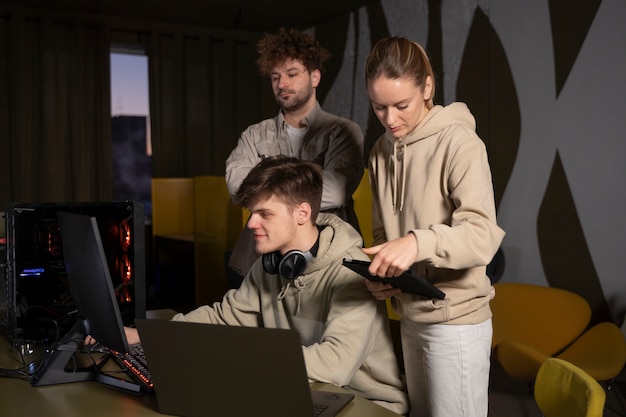
Building Gaming Careers in Tokyo's Digital Heart
Over a decade of experience training the next generation of game developers, designers, and esports professionals
Return HomeOur Story and Mission
PixelCraft emerged from a recognition that's gaming industry needed accessible, practical training programs that bridged the gap between academic theory and professional practice. Founded by veterans from major Tokyo game studios, we set out to create an educational environment where aspiring developers could gain hands-on experience with current industry tools and methodologies.
Our facility in Akihabara places students at the epicenter ofese gaming culture, surrounded by the energy and innovation that defines this district. This location provides more than convenience—it connects our students to the broader gaming ecosystem through regular industry events, studio visits, and networking opportunities that extend beyond the classroom.
From the beginning, our approach has centered on practical application rather than purely theoretical instruction. We recognized that students learn programming languages more effectively by building actual game mechanics, understand design principles more deeply by creating playable prototypes, and grasp business concepts more thoroughly by managing simulated esports events. This philosophy shapes every aspect of our curriculum development.
The gaming industry evolves rapidly, with new engines, platforms, and player expectations emerging constantly. We maintain relevance by continuously updating our course materials, incorporating feedback from hiring managers at gaming companies, and ensuring our instructors remain active in professional development. This commitment to currency means our graduates enter the workforce with skills that match employer needs.
Beyond technical training, we aim to foster a community of creators who support one another's growth. Many of our alumni maintain connections formed during their studies, collaborating on independent projects or providing referrals when studio positions open. This network effect amplifies the value of education beyond the immediate learning experience.
Our Teaching Methodology
Project-Based Learning
Each course revolves around creating tangible outputs—whether game prototypes, design documentation, or event productions. Students learn by doing, encountering and solving problems similar to those they'll face in professional settings. This approach builds both technical competence and problem-solving confidence.
Industry-Standard Tools
Training focuses on software and platforms currently used in professional studios. Students work with Unity for development courses, industry-standard design documentation formats, and streaming technology for esports programs. Familiarity with these tools reduces the adjustment period when transitioning to employment.
Collaborative Development
Many assignments involve team projects that mirror professional workflows. Students experience coordinating with programmers, designers, and producers—learning communication skills and version control practices that are essential in studio environments. These collaborative experiences prepare students for workplace dynamics.
Iterative Refinement
Professional game development involves constant iteration based on playtesting and feedback. Our courses incorporate regular review sessions where students present work-in-progress and receive constructive critique. This process teaches students to accept feedback professionally and implement improvements systematically.
Evidence-Based Approach
Our curriculum design draws from cognitive science research about how people learn technical skills most effectively. We structure courses to balance new concept introduction with practice time, recognizing that mastery requires repeated application in varied contexts. Course pacing accounts for the cognitive load of learning programming languages or design frameworks.
Regular assessments throughout each program provide both students and instructors with feedback about progress and areas needing additional focus. These assessments take various forms—from code reviews to design critiques to presentation evaluations—matching the type of work students will perform professionally.
Meet Our Instructors
Experienced professionals who bring real-world expertise from major game studios and esports organizations
Takeshi Nakamura
Lead Unity Instructor
Spent eight years at major Tokyo studios working on console and mobile titles. Specialized in gameplay programming and physics systems. Has contributed to three commercially released games across different genres. Focuses on teaching practical optimization techniques and debugging strategies.
Yuki Tanaka
Game Design Director
Former lead designer with experience across puzzle, RPG, and strategy games. Brings expertise in player progression systems and monetization design. Has worked on titles with millions of downloads. Emphasizes the importance of playtesting and data-driven design decisions in course instruction.
Kenji Sato
Esports Program Lead
Managed competitive teams and organized tournaments for six years. Experience includes broadcast production, sponsorship negotiations, and community management. Previously worked with regional esports organizations. Teaches students the business and operational aspects of competitive gaming events.
Our Values and Commitment
Practical Skill Development
We prioritize teaching skills that translate directly to professional work. Every lesson, assignment, and project connects to real-world applications. Students learn not just what to do, but why certain approaches work better in production environments. This focus on practical knowledge helps graduates contribute meaningfully from their first day at a studio.
Industry Relevance
Course content reflects current industry practices and tools. We consult with hiring managers and technical directors to ensure our curriculum matches employer expectations. When new technologies or methodologies gain traction in professional settings, we update our materials accordingly. This ongoing refinement keeps our training aligned with market needs.
Student Progress Focus
Individual growth matters more than rigid timelines. While courses follow structured curricula, instructors adapt pacing and provide additional resources when students need more time with challenging concepts. We offer supplementary sessions, code review appointments, and portfolio feedback to support each person's learning journey. This flexibility acknowledges that people develop technical skills at different rates.
Professional Standards
Training emphasizes the professional behaviors and practices expected in studio environments. This includes code documentation standards, version control workflows, meeting etiquette, and constructive feedback delivery. Students learn that technical skills alone don't ensure career growth—professional conduct and collaboration abilities matter equally in advancing within the gaming industry.
Ready to Start Your Training?
Connect with us to learn more about our programs, schedules, and enrollment process